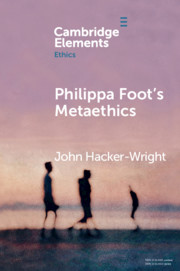Element contents
Philippa Foot's Metaethics
Published online by Cambridge University Press: 18 May 2021
Summary
- Type
- Element
- Information
- Series: Elements in EthicsOnline ISBN: 9781108634038Publisher: Cambridge University PressPrint publication: 10 June 2021
References
- 14
- Cited by

